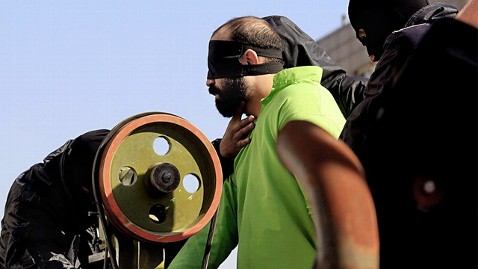Iran Uses Machine to Amputate Criminal's Finger in Public

(ISNA)
Three black-masked men stood on either side of a blind-folded, bearded man and held him as they guided his right hand towards what looks like a saw blade on the side of a large machine. A bloody finger flops off.
The man, a convicted thief and adulterer, suffered the grisly punishment in public in Iran late last week, according a report and graphic pictures posted by Iran's official Student News Agency Friday.
The ISNA published four photographs of the incident, one of which appears to shows a masked member of the Iranian authorities showing the crowd the bloody aftermath of the 29-year-old's hand. The man does not appear to show pain in any of the pictures, leading the French outlet France 24 to speculate he may have been drugged.
Immediately following the amputation, a local prosecutor reportedly issued a warning to all would-be criminals: the punishment for such crimes would be getting more severe.
The amputation comes just days after about 300 people reportedly gathered to witness a public execution by hanging in a Tehran park, as reported by The New York Times. The Times said that the public hanging was part of a "heavy-handed offensive by Iranian authorities, who say they are trying to prevent rising crime rates from getting out of hand by setting harsh examples."
According to Norway-based Iran Human Rights, monitoring of Iran's media shows there have been eight public hangings, one public amputation and four public lashings in Iran in the past 10 days alone.
Mahmood Amiry-Mooghaddam, a spokesperson for the rights group, said he believes the ISNA report is the first time Iranian media has shown the amputation machine - a move he sees as an effort to "terrorize" the Iranian people ahead of the 2013 presidential elections there.
Hadi Ghaemi, executive director for another rights group, the International Campaign for Human Rights in Iran, agreed and said he believes fighting crime is, at best, just part of the reason Iran has suddenly resorted to public punishments.
"Delivering such a cruel and inhumane punishment… [that's] a message to the general public that this regime is capable of extreme violence," Ghaemi told ABC News today, also noting that the authorities may be preparing for public unrest ahead of national elections, not unlike 2009's widespread protests.
Faraz Sanei, an Iranian specialist at Human Right Watch, said it's impossible to know what the government's intent is by holding these spectacles, but said Human Rights Watch believes some punishments "meted out by the judiciary violate Iran's international rights obligations."
Ghaemi said this kind of violence witnessed by Iranian citizens "belongs in the Dark Ages."